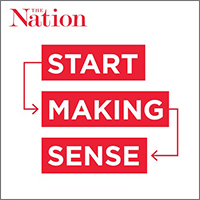 Listen HERE
Listen HERE
We need at last two more justices on the Supreme Court—and more would be better—as many as ten more. Elie Mystal explains—he’s the magazine’s justice correspondent.
Also: how climate change is forcing migration out of low lying coastal areas: Sonia Shah reports on what happened in the Bahamian island of Abaco after Hurricane Dorian last September—and what we need to do now about migration forced by climate change. Sonia is an award-winning reporter; her new book is The Next Great Migration: The Beauty and Terror of Life on the Move. 9-23-2020
The Supreme Court Fight and Joe Biden: Harold Meyerson; Refugees: David Nasaw; “Hacking Your Mind”: Ella Taylor
 Listen HERE
Listen HERE
Trump’s rush to fill the Supreme Court vacancy will help Biden in several ways, Harold Meyerson says–first of all, by making the Republican threat to Obamacare an urgent issue. Harold is editor-at-large of The American Prospect.
Also: Refugees—after World War II in Europe, and today. Historian David Nasaw explains—his new book is The Last Million: Europe’s Displaced Persons, from World War to Cold War.
Plus: Hacking your mind: We make many of our decisions, including political ones, NOT on the basis of what we “think,” but rather on feelings, intuition, and habits. New work by social scientists helps explain how this works for Donald Trump — that’s the argument of a new series on PBS called “hacking your mind.” Ella Taylor has our review. 9-24-20
Trump Needs Wisconsin to Win, but Biden Is Ahead: John Nichols With Good News from a Swing State, plus David Nasaw on Refugees

Voting by mail in Wisconsin will not be thrown into chaos by the state supreme court—John Nichols reports on a state Trump needs to win, where Biden is ahead.
Plus: Refugees—after World War II in Europe, and today. Historian David Nasaw explains—his new book is The Last Million: Europe’s Displaced Persons, from World War to Cold War. 9-17-2020
Chris Hayes: Fear and Hope; Manuel Pastor: Covid and Inequality; Ella Taylor: Russian hackers
 Listen HERE
Listen HERE
We are in “one of the most perilous and fraught moments for American democracy since the mid-nineteenth century,” says Chris Hayes; what’s hopeful is that “the movement we’ve seen in the streets is the largest protest movement in American history.” Chris of course hosts “All In” weeknights on MSNBC; he’s also editor-at-large of The Nation, and he spoke recently with Katrina vanden Heuvel at a Nation magazine online event.
Plus: Covid-19 is the disease that reflects all our social and economic illnesses: that’s what Manuel Pastor says, he’s director of the Equity Research Institute at USC. He reports on who’s got the dangerous jobs and who’s unemployed, which kids have computers and internet connections for at-home classes, and which don’t, and whether Trump’s effort to recruit Latino voters in key states might work.
Also: Russian efforts to interfere with our elections – that’s the subject of a new HBO documentary by one of our favorite documentary makers, Alex Gibney. He’s got footage from inside Russian “troll farms” and videos unearthed from the Russian deep web to reveal the “agents of chaos” who were key players in our elections. Ella Taylor has a review – she’s our resident TV critic. 9-17-20
Chris Hayes: The Catastrophe of Trump; plus Joan Walsh: Politics on TV in 1968
 Listen HERE
Listen HERE
We are in “one of the most perilous and fraught moments for American democracy since the mid-nineteenth century,” says Chris Hayes; what’s hopeful is that “the movement we’ve seen in the streets is the largest protest movement in American history.” Chris of course hosts “All In” weeknights on MSNBC; he’s also editor-at-large of The Nation, and he spoke recently with Katrina vanden Heuvel at a Nation magazine online event.
Plus: Politics on TV–in 1968, when Harry Belafonte hosted the Tonight Show, for an entire week—and his guests included Bobby Kennedy and Martin Luther King. Also: Aretha Franklin. Joan Walsh, National Affairs Correspondent for The Nation, talks about the new documentary, The Sit-In: Harry Belafonte Hosts the Tonight Show—she’s one of the producers, and it’s streaming now on Peacock. 9-10-2020
Rick Perlstein: From Reagan to Trump; Katie Porter on the postal service, Ella Taylor: ’60s TV
 Listen HERE
Listen HERE
Rick Perlstein talks about the rise of Reagan, from what seemed like a career-ending defeat in the 1976 GOP primary, to his narrow victory in the popular vote in 1980–and how the darkness of the culture war has shaped the Republican Party that Trump came to dominate. Rick’s long-awaited book, 1100 pages long, is “Reaganland: America’s Right Turn, 1976-1980.”
Also: Katie Porter, the new member of Congress who flipped a longtime Republican district in Orange County, talks about defending the postal service and about ending student loan debt.
Plus: we’ll talk about politics on TV in 1968 with Ella Taylor — and about a new documentary, called “The Sit-In: Harry Belafonte Hosts the Tonight Show,” when his guests included Bobby Kennedy, Martin Luther King, and also Aretha Franklin. And it’s streaming now on Peacock. 9-10-2020
The East L.A. Blowouts and the Chicano Moratorium: Liberty Hill event w/Manuel Pastor and Judy Baca, Sept. 17
 “The East L.A. Blowouts and the Chicano Moratorium”: Liberty Hill event w/Manuel Pastor and Judy Baca, Sept. 17. 4pm: invitation-only event sponsored by the Liberty Hill Foundation.
“The East L.A. Blowouts and the Chicano Moratorium”: Liberty Hill event w/Manuel Pastor and Judy Baca, Sept. 17. 4pm: invitation-only event sponsored by the Liberty Hill Foundation.
White Backlash Politics: Harold Meyerson; Black Lives Matter: Jody Armour; Cuban doc: Ella Taylor
 Listen HERE
Listen HERE
After Kenosha: will Trump’s efforts to mobilize white backlash voters succeed, the way Nixon did in 1968? “No,” says Harold Meyerson. Trump is the incumbent, not the challenger; the Democrats don’t have a war to defend; and whites are a smaller proportion of the electorate than they were in 1968.
Also: Radically Changing our broken criminal justice system- –Jody Armour’s visionary radicalism. He teaches law at USC and he’s a prominent defender of Black Lives Matter – and his new book has just been published: it’s called “N*gger Theory: Race, Language, Unequal Justice, and the Law.”
Plus: Ella Taylor recommends “Epicentro,” sort of a documentary about Cuba—it’s streaming now on KinoMarquee.com. 9-3-2020
Trump in Kenosha: John Nichols; Black Lives Matter in Europe: Gary Younge
 Listen HERE
Listen HERE
Tump’s visit to Kenosha on Tuesday was part of a backlash strategy, with right wing militias and their allies encouraged to provoke violence with Black Lives Matter demonstrators, followed by Trump claiming he alone can bring an end to “chaos and looting.” John Nichols was in Kenosha for Trump’s visit – he reports on what happened there, and why a backlash strategy won’t work in Wisconsin.
Also: There’s a huge movement in Europe supporting Black Lives Matter. Gary Younge describes some key examples and comments on the effort to address racism in Britain, France, and elsewhere in Europe – and on the English falling back on the argument that racism there is “better” than in the US. Gary lives in London, teaches at the University of Manchester, and is a member of the editorial board of The Nation. 9-3-2020
Chicano Moratorium anniversary event w/Devra Weber and Harry Gamboa Jr.: Vroman’s Fri 8/28
 Watch HERE
Watch HERE
Vroman’s online event with Devra Weber and Harry Gamboa Jr., talking about the Chicano Moratorium – it’s the 50th anniversary — and the Chicano Blowouts. Both were there at the time. Devra is a historian at UCR and a photographer whose photographs appear in our book; Harry is an artist who teaches at Cal Arts.
Aug. 28, 2020.

